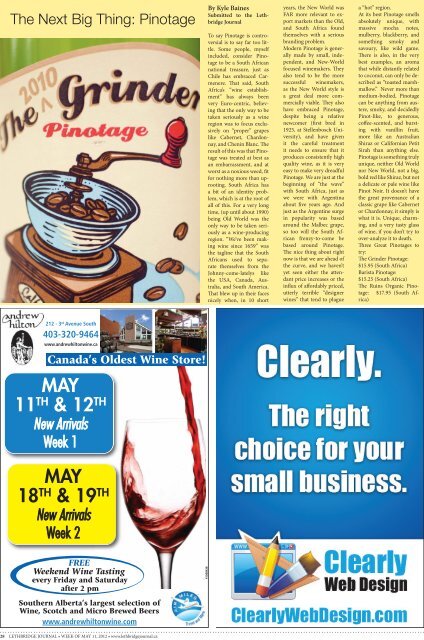Last Minute - The Lethbridge Journal
Last Minute - The Lethbridge Journal
Last Minute - The Lethbridge Journal
Create successful ePaper yourself
Turn your PDF publications into a flip-book with our unique Google optimized e-Paper software.
<strong>The</strong> Next Big Thing: Pinotage<br />
By Kyle Baines<br />
Submitted to the <strong>Lethbridge</strong><br />
<strong>Journal</strong><br />
To say Pinotage is controversial<br />
is to say far too little.<br />
Some people, myself<br />
included, consider Pinotage<br />
to be a South African<br />
national treasure, just as<br />
Chile has embraced Carmenere.<br />
That said, South<br />
Africa’s “wine establishment”<br />
has always been<br />
very Euro-centric, believing<br />
that the only way to be<br />
taken seriously as a wine<br />
region was to focus exclusively<br />
on “proper” grapes<br />
like Cabernet, Chardonnay,<br />
and Chenin Blanc. <strong>The</strong><br />
result of this was that Pinotage<br />
was treated at best as<br />
an embarrassment, and at<br />
worst as a noxious weed, fit<br />
for nothing more than uprooting.<br />
South Africa has<br />
a bit of an identity problem,<br />
which is at the root of<br />
all of this. For a very long<br />
time, (up until about 1990)<br />
being Old World was the<br />
only way to be taken seriously<br />
as a wine-producing<br />
region. “We’ve been making<br />
wine since 1659” was<br />
the tagline that the South<br />
Africans used to separate<br />
themselves from the<br />
Johnny-come-latelys like<br />
the USA, Canada, Australia,<br />
and South America.<br />
That blew up in their faces<br />
nicely when, in 10 short<br />
years, the New World was<br />
FAR more relevant to export<br />
markets than the Old,<br />
and South Africa found<br />
themselves with a serious<br />
branding problem.<br />
Modern Pinotage is generally<br />
made by small, independent,<br />
and New-World<br />
focused winemakers. <strong>The</strong>y<br />
also tend to be the more<br />
successful winemakers,<br />
as the New World style is<br />
a great deal more commercially<br />
viable. <strong>The</strong>y also<br />
have embraced Pinotage,<br />
despite being a relative<br />
newcomer (first bred in<br />
1925, at Stellenbosch University),<br />
and have given<br />
it the careful treatment<br />
it needs to ensure that it<br />
produces consistently high<br />
quality wine, as it is very<br />
easy to make very dreadful<br />
Pinotage. We are just at the<br />
beginning of “the wave”<br />
with South Africa, just as<br />
we were with Argentina<br />
about five years ago. And<br />
just as the Argentine surge<br />
in popularity was based<br />
around the Malbec grape,<br />
so too will the South African<br />
frenzy-to-come be<br />
based around Pinotage.<br />
<strong>The</strong> nice thing about right<br />
now is that we are ahead of<br />
the curve, and we haven’t<br />
yet seen either the attendant<br />
price increases or the<br />
influx of affordably priced,<br />
utterly terrible “designer<br />
wines” that tend to plague<br />
a “hot” region.<br />
At its best Pinotage smells<br />
absolutely unique, with<br />
massive mocha notes,<br />
mulberry, blackberry, and<br />
something smoky and<br />
savoury, like wild game.<br />
<strong>The</strong>re is also, in the very<br />
best examples, an aroma<br />
that while distantly related<br />
to coconut, can only be described<br />
as “toasted marshmallow.”<br />
Never more than<br />
medium-bodied, Pinotage<br />
can be anything from austere,<br />
smoky, and decidedly<br />
Pinot-like, to generous,<br />
coffee-scented, and bursting<br />
with vanillin fruit,<br />
more like an Australian<br />
Shiraz or Californian Petit<br />
Sirah than anything else.<br />
Pinotage is something truly<br />
unique, neither Old World<br />
nor New World, not a big,<br />
bold red like Shiraz, but not<br />
a delicate or pale wine like<br />
Pinot Noir. It doesn’t have<br />
the great provenance of a<br />
classic grape like Cabernet<br />
or Chardonnay, it simply is<br />
what it is. Unique, charming,<br />
and a very tasty glass<br />
of wine, if you don’t try to<br />
over-analyze it to death.<br />
Three Great Pinotages to<br />
try:<br />
<strong>The</strong> Grinder Pinotage:<br />
$15.95 (South Africa)<br />
Barista Pinotage:<br />
$15.25 (South Africa)<br />
<strong>The</strong> Ruins Organic Pinotage:<br />
$17.95 (South Africa)<br />
212 - 3 rd Avenue South<br />
403-320-9464<br />
www.andrewhiltonwine.ca<br />
Canada’s Oldest Wine Store!<br />
MAY<br />
11 TH & 12 TH<br />
New Arrivals<br />
Week 1<br />
MAY<br />
18 TH & 19 TH<br />
New Arrivals<br />
Week 2<br />
FREE<br />
Weekend Wine Tasting<br />
every Friday and Saturday<br />
after 2 pm<br />
41068438<br />
Southern Alberta’s largest selection of<br />
Wine, Scotch and Micro Brewed Beers<br />
www.andrewhiltonwine.com<br />
• • • • • • • • • • • • • • • • • • • • • • • • • • • • • • • • • • • • • • • • • • • • • • • • • • • • • • • • • • • • • • • • • • • • • • • • • • • • • • • • • • • • • • • • • • • • • • • • • • • • • • • • • • • • • • • • • • • • • • • • • • • • • • • • • • • • • • • • • • • • • • • • • • • • • • • • • • • • • • • • • • ••<br />
8 LETHBRIDGE JOURNAL • WEEK OF MAY 11, 2012 • www.lethbridgejournal.ca









